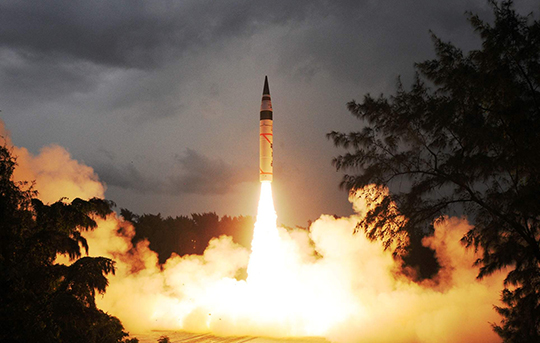Beijing, Jan 5,: India has "broken" UN limits on nuclear arms and long-range missiles and Pakistan should also be accorded the same "privilege", state-run Chinese media said today as it criticised New Delhi for carrying out Agni-4 and 5 missile tests whose range covers the Chinese mainland.
"India has broken the UN's limits on its development of nuclear weapons and long-range ballistic missile," the ruling Communist Party-run tabloid Global Times said in its editorial.
"The US and some Western countries have also bent the rules on its nuclear plans. New Delhi is no longer satisfied with its nuclear capability and is seeking intercontinental ballistic missiles that can target anywhere in the world and then it can land on an equal footing with the UN Security Council's five permanent members," it said.
"India is 'promising' in vying for permanent membership on the UN Security Council as it is the sole candidate who has both nuclear capability and economic potential," it said.
"China should realise that Beijing wouldn't hold back India's development of long-range ballistic missiles," it said apparently highlighting China's limitations in restricting India developing a nuclear and missile deterrence against Chinese military power.
Agni-5, a 5,000-km range intercontinental ballistic missile (ICBM), is widely regarded as a strategic missile targeted at China as it can reach almost all parts of the Chinese mainland.
The editorial said that "Chinese don't feel India's development has posed any big threat to it".
The daily known for its sabre-rattling rhetoric said "India wouldn't be considered as China's main rival in the long run" due to vast disparity of in power between the two countries.
But at the same time it suggested that the "best choice for Beijing and New Delhi is to build rapport".
However, while accusing India of violating limits imposed by UN on nuclear and long range missile development, "if the Western countries accept India as a nuclear country and are indifferent to the nuclear race between India and Pakistan, China will not stand out and stick rigidly to those nuclear rules as necessary", it said.
"At this time, Pakistan should have those privileges in nuclear development that India has," it said, indicating that China which shared an all-weather ties with Islamabad will back it if it develops long-range missiles.
"In general, it is not difficult for India to produce intercontinental ballistic missiles which can cover the whole world. If the UN Security Council has no objection over this, let it be. The range of Pakistan's nuclear missiles will also see an increase. If the world can adapt to these, China should too," it said.
The references to violation of UN rules by the daily were significant as the Chinese Foreign Ministry spokesperson Hua Chunying while reacting to India's Agni-5 missile test said on December 27 that"on whether India can develop this ballistic missile that can carry nuclear weapons, I think relevant resolutions of the UNSC have clear rules".







Comments
Good, China is scared of us.....
Add new comment